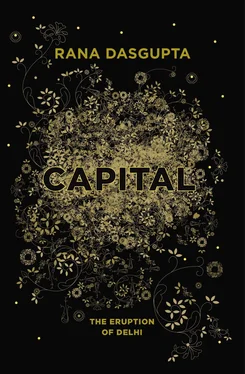“After that I began to manage travel for big corporate clients. Before that I didn’t know how to talk to important people. I didn’t even have a picture in my mind of what they looked like. These clients would spend 12 lakhs [then $30,000] on a trip, and I would have to monitor the entire schedule as they travelled. If a flight was delayed I would call them in the US, tell them the problem, and they would say, ‘Get me on another flight.’ It was very exciting.”
Ranjit now runs his own travel company. He started two years ago with an investment of 1 lakh [$2,000]; now the company has capital of 40 lakhs [$80,000].
“I give excellent service. I work very hard and my money means something.”
Pratap has ordered enormous quantities of food which now arrives, suddenly, in gleaming brass bowls: daal, butter chicken, kebabs, roti. Everyone digs in: this is the kind of food that has you slavering primordially when it is put under your nose.
Whisky keeps coming too, unaccustomed for me, but which I drink by way of conviviality.
Ranjit says, “When I watched my father and brother in the real estate business, I knew I didn’t want to live like that. No standards. No permanent income. You have to drink every night with the police — my father would drink two or three bottles a day and come home dead. If you want to be in the property business you have to work like that. And every night you say, ‘God, I did this today. Please forgive me.’
“I don’t like that world. I don’t like how those people have no respect for money: money comes easily and just disappears on clothes and drink and trips. If you work hard for your money, you will save that money.
“Not only that, but real estate people have no respect in society. You only need a table, three chairs and a phone to do that business. People say, ‘If you can’t do anything else, you do that.’ My brother cannot sit still on a chair all day long and concentrate on a screen. He has to jump around all day and be on the phone.
“Now I’m happy with my life. I’ll work as long as I live because I love this work. I want to make it on my own. I want to look after my children and give them a better education. The only thing I still need to sort out is my wife. I don’t like her working so far away from me. I’m planning to train her in the travel agency business so she can work with me.”
“Every day,” says Gautam, “he drives two extra hours so he can drop her to her office before he goes to work, and pick her up again afterwards. He won’t let her travel the streets on her own.”
“But my closest relations are with my friends,” says Ranjit. “Not with my family. Not even my wife. If I need help, I call my friends first. One thing I don’t like is that I work so hard now, I don’t see my friends as much as I used to. I keep asking Gautam if he wants to go on a trip. But he doesn’t have time for me.”
He says it with some edge. Actually it approaches a conflict in their relationship. Gautam has recently married a white American woman, of whom Ranjit does not totally approve, and sometimes it is awkward for them to be together.
“Ranjit never says it to me because he is a very nice man,” says Gautam. “But inside him those issues are deep. Hindus and Muslims. He can’t stand it if I have Muslim friends.”
I am slightly confused. “But your wife is not Muslim,” I say.
“Muslim, Christian — it’s all the same. It’s not Hindu. It’s not Hindu culture. Ranjit is bothered by everything that disrupts Hindu culture. For instance, I don’t live with my parents and Ranjit always tells me this is not our culture, and I say, ‘But my sister lives with them!’ and he says, ‘Don’t try to escape your duty. It is the son who should take care of his parents. It’s your responsibility.’”
I finish eating and run away from the table to wash my hands. With this food, the passage from pure animal craving to incapacitation and remorse is remarkably rapid. Afterwards you are desperate for hydration, because it is constituted, overwhelmingly, of oil. You drink glass after glass of water but it doesn’t make any difference, because it will never penetrate the pure lipid you have become.
The conversation turns to cricket. Or, more particularly, the private lives of cricketers. Pratap, who is sitting on the other side of me, is unable to engage with this sporting gossip, and stares off into the distance. I try to rouse him from his silence. He tells me about his working life.
“It’s getting very tough out there,” he says. “It’s becoming a winner-take-all market. Smaller guys are going under, and the fight at the top is more vicious.”
“What can you do about it?”
“You can’t plan beyond a point. No one knows the future. The main thing we have done is to diversify our income. From a metal trading business we began a metal import business. From those two businesses we began buying land outside Delhi for development. We also bought a property in Delhi which we run as a gym. We will always have several businesses, whatever happens. If one doesn’t work, others will.”
I ask Pratap if he considers himself a rich man.
“I have a lot of respect in my family,” he says. “I have given money to many of my relatives, and I have given my sister’s son a job. But I am not rich. In Sadar Bazaar terms I am one of the smallest traders. Many of them have been there for a century and they control far bigger markets.”
“The Forbes list of billionaires only includes white money billionaires of course,” I say. “Corporate billionaires, whose money is publicly accounted. But there must be many other billionaires who will never come to the attention of Forbes. Cash billionaires.”
“How much is a billion dollars?” asks Pratap.
“Five thousand crores.”
“Oh, there are several in Sadar Bazaar who have that. If you lower the bar to 1,000 crores, there are very many. But you would never know from looking at them.”
This is a conversation that interests everyone. They all pitch in with their stories of fabulous wealth. Someone has read about a gold bathtub.
I ask, “Who is the richest person in Delhi?”
Several men shout, “Madhu Koda!” — which is a joke. Madhu Koda is the story of the moment: a poor-farmer’s-son-turned-billionaire politician. The newspapers have been breathless with his life story. He began working as a miner and welder, entered politics in Bihar in the early 1990s and became a minister in Jharkhand when that state was carved out of the former. Minister with authority over mines and minerals, in fact, in a state whose enormous natural resources were just then, in the wake of liberalisation, attracting a stampede of mining corporations from all over the world. Later on, during his tenure as chief minister, Madhu Koda was arrested for possessing assets and investments valued at close to a billion dollars. He allegedly owned mines in Liberia, a $200 million real-estate development in Dubai, business investments in Sweden, Thailand and Indonesia — as well as resorts and houses all over India, including in two of Delhi’s most exclusive neighbourhoods. This money was amassed, in part, by selling mining licenses to corporations for cash. It was part of a grand business plan, the newspapers reported, that was intended to culminate in respectability and a listing on Nasdaq, but it was impossible to keep a lid on it all that way.
It is in some ways a grimy tale, and yet it has also the thrilling glint that all rags-to-riches stories possess. And it is stunning evidence for the truth that politics, for India’s poor, is the quickest and most accessible route to wealth. Stories of poor people making fortunes through business are much loved, but in practice they almost never happen. Politics, however, which offers so many quotas and breaks to those from the most marginalised sections of the population, has made many of India’s poorest rich. If you have no money, status or connections and you want to get rich in your own lifetime, politics is the absolutely rational career choice. Corrupt politics, in this sense, is a corrective to the brutal inertia of the rest of society, which is why, for many, it is not so much a reason for despair as the main source of hope.
Читать дальше











